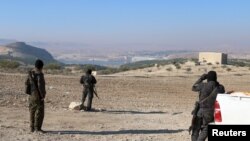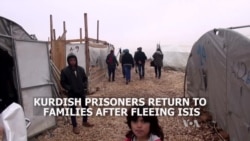Nineteen people from near the Kurdish Syrian town of Kobani fled an Islamic State (IS) prison this week after U.S.-led coalition airstrikes hit the area where they had been held, some of the ex-prisoners told VOA.
At least 13 of them were from one family. They are now resettled in a refugee camp outside the border city that was a battlefield between Kurdish forces and IS militants last year.
They talked to VOA shortly after they arrived in Kobani. IS went to their village six months ago and rounded up residents and jailed them, they said.
“We were held…for five months, but last month they [IS] moved us to another prison,” said Sherif Mislim, an elderly man who was among the prisoners.
Watch: A refugee camp outside Kobani.
The Kurdish prisoners were first held in the IS-controlled town of al-Bab in eastern Aleppo. As the coalition warplanes targeted the prison last week with an airstrike, IS guards fled and the prisoners were able to make their way out of the building.
“The building wasn’t entirely damaged from the airstrike and this worked to their [prisoners] advantage,” Seyfedin Qasim, a local official in Kobani Canton, told VOA by phone.
While in captivity, prisoners spoke of torture and ill treatment by IS guards.
“After long investigations, they would badly beat us up,” said one ex-prisoner, Osman Sherif. “They kept us at an underground prison and we didn’t know when they would behead us.”
Sherif said they were blindfolded often. He also said IS commanders questioned them to find out if they supported the Democratic Union Party (PYD), whose armed wing, the YPG, has been making advances in the fight against IS.
Supported by international coalition air support, the YPG forces have pushed IS out of several Kurdish regions in northern Syria. Most recently, they have marched towards new territories controlled by IS in the eastern part of Aleppo province.
“The [U.S.-led] coalition is giving momentum to our forces on the ground,” said Qasim, the local official in Kobani, explaining why more people are able to flee IS-control.
According to local accounts, there are at least 500 Kurdish prisoners held by IS whose fate is unknown. They were arrested over the course of nearly two years.
“With the help of Arab tribes, we have tried to negotiate a prisoner exchange with Daesh [IS], but they always don’t keep with their promises,” Qasim said.
IS militants had hoped to use the Kurdish prisoners as fighters in the future, the recently freed prisoners said.
“They were preparing us to undergo Islamic education courses,” said ex-prisoner Mislim. He is planning to go back to his village from where he was taken by IS six months ago. It is now under Kurdish forces’ control.






